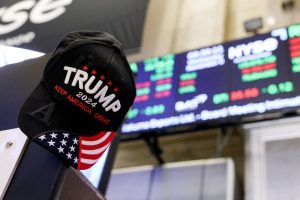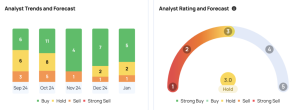
The labor market ended 2024 on a strong note, adding 256,000 jobs in December, exceeding economist forecasts and showcasing once again the resilience of the U.S. economy.
Nonfarm payrolls rose by 256,000 last month, up from the downwardly revised 212,000 in November and sharply surpassing economist expectations of 160,000 payrolls as tracked by TradingEconomics.
US Labor Market Defies Gravity, Unemployment Rate Falls
The December payroll figure released Friday by the Bureau of Labor Statistics surprised to the upside for the second consecutive month, signaling the U.S. labor market’s strength continues to defy gravity. The outcome marks the strongest employment growth since March 2024.
The unemployment rate fell from 4.2% to 4.1%, beating forecasts of an unchanged reading.
Average hourly earnings rose 0.3% month-over-month in December, matching expectations but slowing from November’s 0.4%. On a year-over-year basis, wages increased 3.9%, slightly below of the 4% forecast.
Key Sectors Driving Employment Gains
Employment growth in December was led by gains in health care, retail trade and government, while leisure and hospitality showed minimal change.
Health care added 46,000 jobs, continuing its consistent upward trajectory, while retail trade recovered from a loss of 29,000 jobs in November, posting a gain of 43,000 jobs in December.
Government employment was also robust, adding 33,000 positions last month. Social assistance contributed an additional 23,000 jobs, reflecting steady demand in support services.
Employment in leisure and hospitality showed little movement, with a modest increase of 43,000 jobs.
Market Reactions
The stronger-than-expected jobs report complicates the Federal Reserve’s path forward.
While the labor market’s resilience signals robust economic growth for the fourth quarter, it forces policymakers to remain laser-focused on their inflation mandate, as recent price pressures have resurfaced, likely supporting a hawkish stance in the months ahead.
Yields on two-year Treasury bonds — which are highly susceptible to interest rate expectations — spiked by 11 basis points to 4.38%, reflecting fears that the Fed might push monetary easing further down the road in 2025.
The U.S. Dollar Index (DXY), which is tracked by the Invesco DB USD Index Bullish Fund ETF UUP, rallied by 0.3% in the minutes after the release.
Markets reacted with caution. Futures tied to the S&P 500 showed a 0.6% loss in Friday’s premarket trading.
Read Next:
Photo via Shutterstock.
Market News and Data brought to you by Benzinga APIs
© 2025 Benzinga.com. Benzinga does not provide investment advice. All rights reserved.


